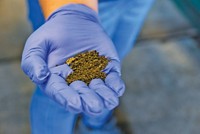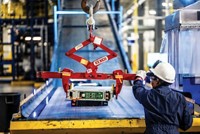Advertisement
Grab your lab coat. Let's get started
Welcome!
Welcome!
Create an account below to get 6 C&EN articles per month, receive newsletters and more - all free.
It seems this is your first time logging in online. Please enter the following information to continue.
As an ACS member you automatically get access to this site. All we need is few more details to create your reading experience.
Not you? Sign in with a different account.
Not you? Sign in with a different account.
ERROR 1
ERROR 1
ERROR 2
ERROR 2
ERROR 2
ERROR 2
ERROR 2
Password and Confirm password must match.
If you have an ACS member number, please enter it here so we can link this account to your membership. (optional)
ERROR 2
ACS values your privacy. By submitting your information, you are gaining access to C&EN and subscribing to our weekly newsletter. We use the information you provide to make your reading experience better, and we will never sell your data to third party members.
Energy Storage
Big battery recycling site planned for Europe
Glencore and Li-Cycle hope to turn an old Italian facility into Europe’s largest battery recycling plant
by Matt Blois
May 13, 2023

Following Glencore’s $200 million investment last year in the battery recycler Li-Cycle, the two companies are considering a joint venture that would turn Glencore’s lead-zinc smelting facility in Sardinia, Italy, into Europe’s largest battery-recycling plant.
The companies hope to collect used lithium-ion batteries at a network of facilities Li-Cycle is building around Europe. Those preprocessing facilities will shred the batteries into black mass, a mixture of cathode and anode materials. Li-Cycle says it submerges batteries in water so that it can safely shred fully charged batteries without dismantling them, improving the efficiency of the process.
The nearly century-old facility in Italy would leach the black mass with sulfuric acid to extract lithium, nickel, and cobalt chemicals. The extracted lithium would then be upgraded into lithium carbonate for producing new batteries. The companies hope the plant will be able to process 50,000 to 70,000 metric tons (t) of black mass per year. They aim to open it in 2026, pending the results of a feasibility study.
In March, the US Department of Energy conditionally committed to loan Li-Cycle $375 million to finance a similar facility in Rochester, New York. Li-Cycle expects it to convert 35,000 t per year of black mass from preprocessing facilities across North America into lithium carbonate, nickel sulfate, and cobalt sulfate. In 2022, Glencore proposed a joint venture to recycle scrap from Britishvolt’s battery manufacturing plant, though the battery maker went bankrupt earlier this year.
In the joint venture with Li-Cycle, Glencore plans to process recovered nickel and cobalt at a refinery in Norway. Glencore already recovers those two metals from batteries in Norway and Canada, but it doesn’t recover lithium.
Hans Eric Melin, founder of the battery-recycling consultancy Circular Energy Storage, says the partnership with Li-Cycle gives Glencore both a way to recover lithium and a reliable source of black mass. “It’s really hard for them to get a hold of the black mass because somebody else will always pay more if they have the ability to recover lithium,” he says. “They needed a process.”
Melin adds that Glencore’s mining and commodity-trading businesses will be a critical complement to its recycling activities because it will take years before the volume of old batteries ready for recycling is enough to consistently supply raw materials for makers of new batteries.
“The connection to primary material is key,” he says. “The story of recycling and green technology is great, but for a long time you’ll have to supplement your production of chemicals with primary materials.”




Join the conversation
Contact the reporter
Submit a Letter to the Editor for publication
Engage with us on Twitter